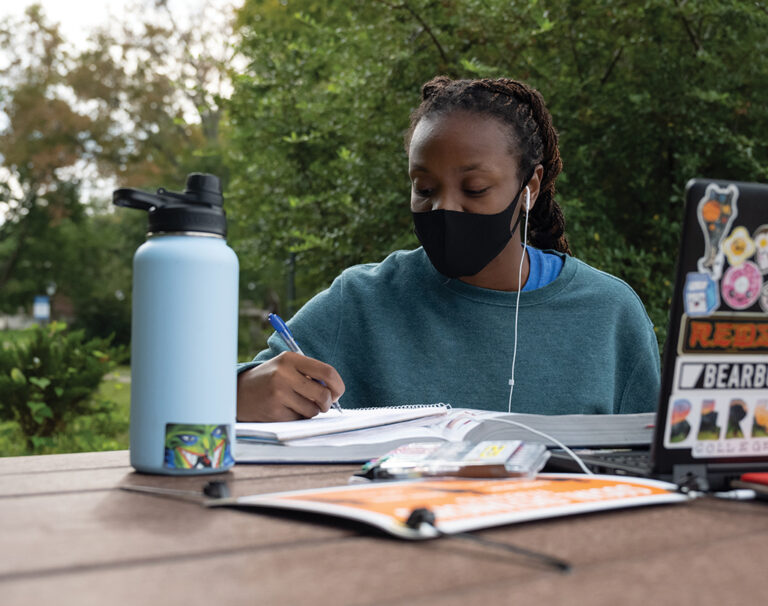Facing the challenges of mental and emotional health head-on
Concerned with the national trend in declining mental health among students entering colleges and universities, President Lyle Roelofs and then-Academic Vice President and Dean of the Faculty Chad Berry convened a Task Force on Trauma and Resilience in fall 2018. The task force was charged with examining Berea students and their risk factors as well as making recommendations for taking a holistic and proactive approach for responding to student trauma and increasing student resilience.

“Student trauma and mental health issues are on the rise at colleges and universities across the country,” said Chris Lakes ’98, director of the Office of Student Success and Transition. “It’s very well documented and happening at all institutions. At Berea College, a place where we serve students from low-income backgrounds, poverty is one of the primary indicators of negative outcomes in student mental health.”
The student population served by the College is at risk of higher levels of stress, anxiety and mental fatigue. Acknowledging these obstacles, the goal of the task force was to develop a more comprehensive, cohesive response to the experiences and challenges students bring with them into higher education.
The 16-member task force represented various academic departments, Student Life, the Willis D. Weatherford Jr. Campus Christian Center, Counseling Services and Institutional Research and Assessment. It identified 21 recommendations, separated into five broader categories: increasing resilience and reducing stress on campus; professional development for faculty and staff; increasing campus awareness of traumas, adverse childhood experiences and resilience; structural or positional changes; and continued oversight, review and data sharing. With a full list of recommendations, the task force began conversations about implementation. However, as with all facets of Berea’s operations, the COVID-19 pandemic presented a significant challenge.
Some of the recommendations were able to gain real traction before staff and students left to work remotely in March 2020, Lakes said. “We’ve implemented a few recommendations that have had positive results, but some of the others have obviously landed on the back burner,” he said. The College ended in-person instruction in March 2020 and in fall 2020 implemented a learning environment that includes in-person or distance learning as chosen by the student.
Student trauma and mental health issues are on the rise at colleges and universities across the country. It’s very well documented and happening at all institutions. At Berea College, a place where we serve students from low-income backgrounds, poverty is one of the primary indicators of negative outcomes in student mental health.
Chris Lakes ’98
One recommendation for faculty reading groups already has offered participants insight into challenges facing Berea students. To date, three different groups have convened, reading and discussing books that offer guidance on addressing particular challenges Berea’s students face. There also has been a group review of a short film related to adverse childhood experiences. The recommendation for training faculty and staff on how to respond directly to students who are experiencing emotional stress also has resulted in helpful conversations.
Berea students experience similar issues to students across the country, but because many are coming out of challenging backgrounds, they struggle disproportionately with things like food insecurity, feeling supported by their family, divorce and separation, and housing insecurity.
“So many of our students have played a caregiver role for a grandparent or siblings,” Lakes said. “They are not able to provide in ways that they would like, and there are feelings of shame, guilt and frustration that can lead to disparities in those students.”
In addition, the stress levels Berea College students report are higher than their national peers, as revealed in a 2010 American College Health Association National College Health Assessment survey. Sixty-six percent of Berea males and 49 percent of Berea females reported “more than average” or “tremendous stress” compared nationally to 56 percent of males and 42 percent of females.
“One source of stress is the pressure to succeed at Berea given students’ limited options for high-quality education that is affordable,” said Sue Reimondo, director of Counseling Services. “Because Berea College charges no tuition, students are encouraged to graduate in four years to enable as many students as possible to receive a degree at the College who may not otherwise have the opportunity to earn one.”
Individual recommendations from the task force are continuing, including what is referred to as “gatekeeper training for natural helpers.” The training for faculty and staff who interact with students on a regular basis will help prepare them for how to support students’ mental health.
Throughout the Winter 2021 issue, the specifics of many of the task force recommendations are explored and their impact and implementation explained in greater detail. The work of the task force is happening across campus in a number of areas, with facilitation and coordination from the wellness program, Student Life and the Office of Student Success and Transition, among others.
“Part of my job in the spring,” Lakes said, “will be to pull people back together and focus on what we have been able to accomplish during the COVID-19 pandemic, and how to get momentum back in 2021, when a lot of people will return to campus and engage in a world that is very different since the shutdown.”


